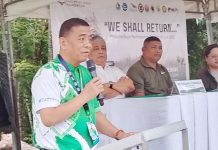Five years after
TACLOBAN CITY- Imelda Tacalan, 48, feels nothing but heavy heart every time November 8 approaches.
Like her fellow survivors of super typhoon ‘Yolanda’ in Balangiga, Eastern Samar, Tacalan has not yet been relocated to a government-led permanent housing site in their area after it was found out that their units were allegedly “substandard.”
She said that of the 460 housing units intended for Yolanda survivors of their town, only 230 were constructed yet but were declared to be of not good quality.
“I envy those Yolanda survivors whose relocation sites are managed by non-government organizations. They have better units compared to us,” Tacalan said in an interview.
This sentiment was also shared by Lita Bagunas of the Uswag Este-Katarungan.
She said that the houses constructed by the National Housing Authority have weaker construction materials used with the walls could easily be shaken.
Bagunas added that the housing projects that were started under President Rodrigo Duterte continue to be of substandard quality comparable to the ones constructed under the then administration of Benigno Aquino III.
“Akala namin change is coming. Hindi rin pala,” she said whose group is part of the coalition of storm victims known as Community of Yolanda Survivors and Partners (CYSP).
The group said that housing projects in Lawaan and Balangiga continue to face complaints due to their “poor quality.”
According to Joli Torella of Urban Poor Associates, many housing areas in Yolanda-hit areas generally lacked basic social services.
The added cost of transportation and lack of access to these social services made life more difficult in the relocation sites, he said.
“Families transferred at St.Francis Village find it difficult to live there because aside from lacking basic services, there’s flooding when it rains,”Vincent Basiano, a resident of said relocation site located in Barangay Suhi, Tacloban City, said.
CYSP alleged that the relocation of 3,000 families was fast-tracked even as the relocation sites were still lacking basic social services like water, electricity, schools, and difficult access to public transport.
(RONALD O. REYES)



